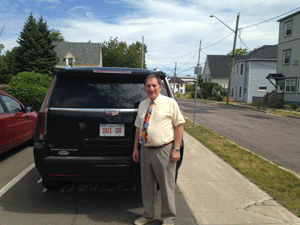
The New Brunswick Court of Appeal has ruled a criminal lawyer can keep his controversial DUI DR vanity licence plates.

In a recent ruling, Justice Kathleen Quigg said the plates and their controversial message might seem like an inconsequential privilege, but “privileges such as these are connected to fundamental rights enshrined in the Charter under freedom of expression, and no matter how trivial this expression may seem to a third party, it appears to have substantial personal value to Mr. Maxwell.”
Wendell Maxwell, a 76-year-old lawyer who has been practising criminal law with a focus on impaired driving cases for 48 years, first registered his plates in 2008. The Moncton lawyer is in court almost every day around New Brunswick, Nova Scotia and Prince Edward Island, and “99 per cent” of those cases deal with impaired driving. He wanted plates that reflected what he does, he says, noting he had seen a dentist’s plate that read TOOTH DR and liked the idea.
Though the DMV did initially question the appropriateness of the message, DUI was not on the list of banned phrases at that time and when Maxwell threatened legal action, it issued the plates. Maxwell renewed them without issue until November 2014, when he was told by the registrar of Motor Vehicles via a letter to return the plates as they had been “erroneously issued.”
“That was a falsehood,” Maxwell says. He says he spoke to a deputy at the registrar, and she discussed it with her boss before issuing him the plates in 2008.
“That doesn’t sound erroneous to me,” he says.
The registrar stated it had received multiple complaints, including from the national and Fredericton chapters of Mothers Against Drunk Driving, but made no mention of this — or any other reason for its decision — in the 2014 letter to Maxwell revoking the plates.
Maxwell says he respects MADD’s viewpoint, but he reiterates that his vanity plates are simply a nod at what makes up the majority of his caseload.
“I strongly discourage drinking and driving — I sure as heck don’t promote it,” he says, pointing out he is a teetotaler himself.
In response to the letter retracting his plates, Maxwell filed an application for judicial review, which was heard at the Court of Queen’s Bench on June 24, 2015, and a decision was rendered the same day.
The registrar was ordered to reinstate Maxwell’s plates as the judge found there was a breach of procedural fairness and the registrar’s decision was unreasonable given there was no evidence presented to provide a basis for its decision. The application judge also ordered the registrar to pay costs to Maxwell in the amount of $5,000.
The registrar appealed, and Maxwell says while he was originally upset the government chose to appeal the original decision, he’s “very pleased with the ruling. They gave a strong decision.”
Along with the lack of rationale given to Maxwell in the 2014 letter, the appeal court focused on how the Department of Motor Vehicles came to its decision to revoke the plates, and ultimately upheld the initial ruling.
“Fuelling any legal doctrine are the foundational principles of natural justice and equal treatment under the law,” Quigg said in the decision.
“These principles are not diminished because the subject matter of a case may be objectionable in the community.”
Quigg noted Maxwell was given no opportunity to respond before the plates were revoked and wasn’t given the right of appeal. Ultimately, Maxwell wasn’t given “the most minimal requirement of procedural fairness.”
The judge dismissed the registrar’s appeal and ordered $3,000 in costs.